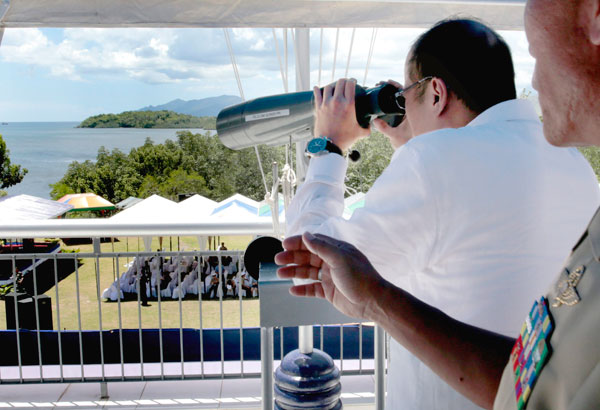
President Aquino scans the West Philippine Sea during the 116th anniversary of the Philippine Navy in Ulugan Bay in Puerto Princesa City, home of the Naval Forces West. It was the first time that the Navy anniversary was celebrated in Palawan.
President Aquino is open to a new security alliance with the United States as embodied in the Mutual Defense Treaty of 1951 and the Visiting Forces Agreement.
He said this when asked about the new “security architecture” in the Asia-Pacific region reportedly being eyed by the US with its strategic partners and allies, including the Philippines.
“We both want to be real in the sense that we will improve the inter-operability, capability of their most advanced forces and ours that is just trying to build up its capability,” Aquino told reporters yesterday in a chance interview following the celebration of the Philippine Navy’s 116th anniversary in Palawan.
The President said he is unperturbed by the petitions filed with the Supreme Court (SC) questioning the legality of the Enhanced Defense Cooperation Agreement (EDCA) with the US government.
The new security arrangement is being eyed as tensions over China’s aggressive actions in the South China Sea continue to rise.
The STAR reported the plan to establish a new security alliance in the Asia-Pacific that would require the US to work with “spokes” including Australia, Japan, the Philippines, and possibly Singapore and Thailand.
The US is also convincing Malaysia to join the security architecture, which is part of Washington’s plan to rebalance its forces in Asia Pacific.
Three of the countries being eyed to join the alliance – Japan, Malaysia and the Philippines – are embroiled in territorial disputes with China.
Japan and China are claiming the uninhabited Senkaku Islands in the East China Sea.
China’s territorial claim in the West Philippine Sea covers about 90 percent of the potentially oil- and gas-rich area and overlaps with those of the Philippines and Malaysia as well as Vietnam, Brunei and Taiwan.
Second petition vs EDCA
The SC yesterday received another petition to stop the implementation of EDCA and void it for being unconstitutional.
In a 101-page petition, militant groups led by Bayan Muna Representatives Neri Colmenares and Carlos Zarate asked the high court to issue a temporary restraining order enjoining the government from implementing the deal forged by the Philippine and US governments.
It was the second petition filed against the defense pact signed on the day US President Barrack Obama visited the country last month.
The new petitioners raised the same arguments cited in the first petition filed on Monday by former senators Rene Saguisag and Wigberto Tañada.
They alleged that EDCA is a basing agreement that needs the concurrence of the Senate under the Constitution – contrary to the claim of the administration that it is merely an executive agreement and not a treaty.
“EDCA clearly involves the entry of foreign troops and facilities in Philippine territory. EDCA authorizes US forces and contractors, vehicles, vessels and aircraft operated by or for US forces to have access to and conduct activities in agreed locations,” the lawmakers said through lawyer Rachel Pastores.
They cited Article XVIII Section 25 of the Constitution, which requires that foreign military bases, troops or facilities “shall not be allowed in the Philippines except under a treaty duly concurred in by the Senate.”
The petitioners noted that the use of the term “agreed locations” clearly shows the real nature of the deal since it was used by the US government to describe a forward base.
They said EDCA allows prepositioning and deployment of US ships, aircraft and even missile systems.
“Deploying forces and materiel includes the launching of military drones, which have become not just surveillance planes but deadly offensive weapons. The Philippines has become a launching pad for covert or overt US military operations abroad,” read the petition.
They alleged that EDCA jeopardizes the sovereignty of the country as it gives “Americans blanket authority to take appropriate measures to protect US personnel and private contractors, which may include arrests and even the use of lethal force. The US is merely obliged to coordinate such forceful measures with the Philippine government.”
They said that EDCA also violates Article II Section 8 of the Constitution, which prohibits nuclear weapons in the country.
It contravenes national interest as it exempts US troops from payment of taxes and fees in use of public utilities, the petitioners said.
Under the EDCA, the US will be allowed to build structures, as well as preposition weapons, defense supplies and materiel, station troops, civilian personnel and defense contractors, transit and station vehicles, vessels and aircraft in the country for a period of 10 years.
The two militant lawmakers were joined by Bayan secretary-general Renato Reyes Jr., Gabriela Women’s Party Representatives Luzviminda Ilagan and Emi de Jesus, ACT Teachers Rep. Antonio Tinio, Anakpawis Rep. Fernando Hicap, Kabataan Rep. Terry Ridon, National Artist for Literature Bienvenido Lumbera, film director Joel Lamangan, anti-bases activist Renato Constantino Jr. and members of the Makabayan Coalition led by Satur Ocampo and Liza Maza.
The Kalikasan People’s Network for the Environment led by Clemente Bautista also joined the petition.
Bautista said past environmental violations of US troops in the Philippines were not addressed in EDCA such as the grounding of USS Guardian in Tubbataha Reef and dumping of toxic waste by a US Navy contractor in Subic Bay.
The filing of the new petition coincided with the 15th anniversary of the ratification of the Visiting Forces Agreement, which the petitioners had also assailed before the SC.
http://www.philstar.com/headlines/2014/05/28/1328127/noy-open-new-security-alliance-us

No comments:
Post a Comment
Note: Only a member of this blog may post a comment.